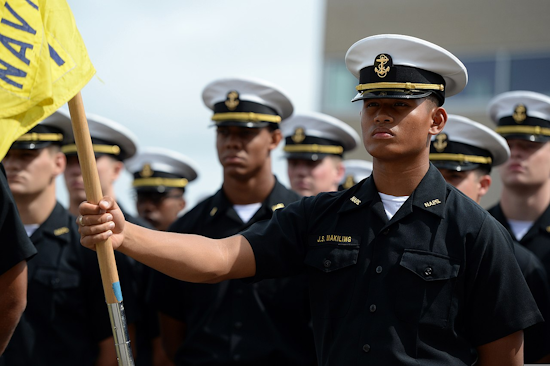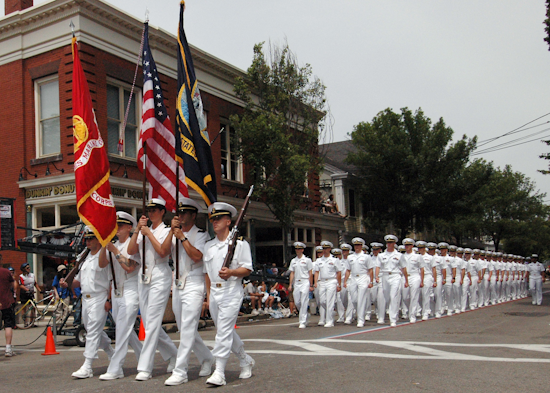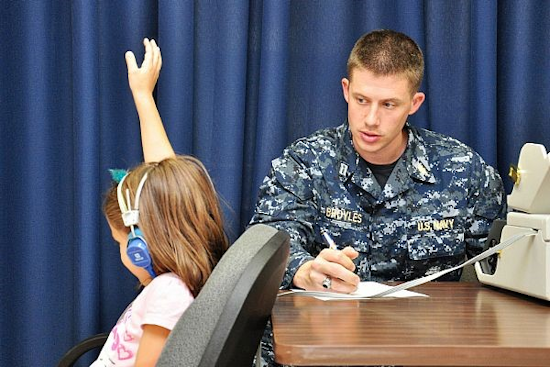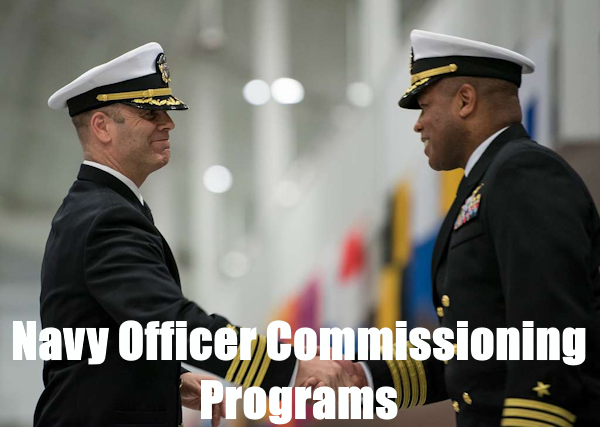Navy officer programs are an opportunity for a significant promotion within the military ranks.
The United States Navy offers programs for both enlisted personnel as well as civilians seeking to make the transition.
As such, there are a multitude of opportunities for those willing to join the U.S. Navy.
Learn more about the purpose and basic requirements of Navy officer programs.
Related Article – Best Navy Officer Jobs
Table of Contents
Navy Officer Commissioning Programs

The United States Navy is widely considered one of the best military institutions in the world.
The service branch not only has impressive warships and pilots but also offers many different commissioning programs.
Navy commissioning programs are designed to promote service members to the ranks of an officer.
For this reason, the Navy has implemented a variety of officer programs (more details, below) each with its own unique purpose or mission.
Navy enlisted-to-officer programs provide sailors with a unique opportunity.
However, Navy officer programs are not just limited to enlisted personnel.
In fact, many Navy officer programs also embrace civilians looking to attend college and earn a degree, while also fulfilling a service obligation.
As a result, people interested in becoming doctors or engineers consider the U.S. Navy thanks to its generous tuition assistance.
Navy commissioning programs offer a wealth of opportunities for advancement along with developing leadership and management skills.
Accordingly, many Navy officers also find rewarding careers after their military duty is complete.
Navy Officer Programs (2023)
The U.S. Navy offers many different officer programs for both civilians and enlisted personnel.
These programs provide a wealth of knowledge as well as the opportunity to learn a specialty.
Currently, the United States Navy has the following officer programs:
- United States Naval Academy (USNA)
- U.S. Navy Preparatory School (NAPS)
- Navy Officer Candidate School (OCS)
- Medical Enlisted Commissioning Program (MECP)
- Medical Service Corps In-service Procurement (MSC)
- Limited Duty Officer (LDO) and Chief Warrant Officer (CWO) Programs
- Seaman to Admiral-21 (STA-21) Program
Then, there are several other specialty officer training programs under the above departments (more information, below).
The purpose of each program varies, yet all have the intention of developing Navy commissioned officers.
In general, the competition for Navy officer programs is intense and demands the best in personal character and fitness.
Those interested in learning more specifics regarding Navy officer program requirements should review the OPNAVINST 1420.1B manual.
Learn more about Navy officer programs including the general guidelines and requirements.
Related Article – How To Join The US Navy
U.S. Naval Academy (USNA)

The United States Naval Academy (USNA) is a federal service academy that graduates students who transition into commissioned officers.
Navy midshipmen (officers-in-training) refer to the campus as “the Yard” (Annapolis, MD) which is home to many historic sites and monuments.
The Naval Academy dates back to 1845 and is the second oldest of the five U.S. service academies.
Entry into the U.S. Naval Academy is notoriously difficult, with admission being among the most competitive in the nation.
In fact, candidates must apply for a separate nomination, which is generally granted by a member of Congress.
However, the benefit is that tuition is fully funded in exchange for a service obligation following graduation.
Each year, approximately 1,200 plebes enter the academy, and fewer than that graduate.
Those who graduate are commissioned as either an ensign in the Navy or a second lieutenant in the Marine Corps.
The academy features some of the highest-paid graduates in the country, according to starting salary.
Naval Academy Preparatory School (NAPS)

The Naval Academy Preparatory School (NAPS) features intensive academic instruction and physical training in preparation for the Naval Academy.
Students are considered active duty while attending Officer Training Command (OTC) in Newport, Rhode Island.
Then, once students graduate from NAPS, they become midshipmen at the U.S. Naval Academy and are one step closer to a commission.
For this reason, NAPS is another avenue for people who want to become Navy officers.
The basic eligibility requirements stipulate that applicants must be citizens of the United States and between the ages of 17 to 23.
Furthermore, candidates must be of “good moral character” with no record of disciplinary action within 3 years of the application.
Moreover, NAPS seeks students who are unmarried, not pregnant, and have not incurred any parental obligations.
Students must also meet the physical requirements of the United States Navy.
Related Article – Nuclear Propulsion Officer Candidate Program (NUPOC)
Officer Candidate School (OCS) Program

Navy Officer Candidate School (OCS) is another outstanding way to become an officer in the service branch.
Navy OCS is designed as an initial commissioning program for individuals who possess at least a bachelor’s degree.
The 13-week program takes candidates through concentrated officer training at Naval Station Newport, Rhode Island.
Future Navy officers from the enlisted ranks may be evaluated and recommended by their commander. Others may come from an ROTC program.
Graduates of Navy OCS are appointed as Navy ensigns for a minimum service requirement of 3 to 5 years.
There are several means to achieving Navy OCS, even if you are already attending school or plan to in the near future.
Navy officers earn substantially better pay and enjoy other benefits of military service.
Navy Medical Enlisted Commissioning Program (MECP)

The Navy Medical Enlisted Commissioning Program (MECP) is a terrific opportunity for aspiring nurses.
What’s exciting about MECP is that it provides a pathway for active duty enlisted personnel at all different military ranks.
Therefore, the restrictions on the Navy rating are not placed on MECP, like some other officer programs.
In fact, applicants do not need a college degree (like Navy OCS) as long as they possess college credit that can transfer to a nursing degree.
All in all, the goal is to obtain a baccalaureate degree in nursing and, later, a commission in the U.S. Navy.
Graduates have a service obligation (just like the other Navy programs).
Furthermore, the program is not intended to serve as a precursor to medical school.
Candidates are selected for the program and are required to earn a degree in nursing.
Nonetheless, MECP students receive full military pay, housing allowances, and benefits while attending school.
Be that as it may, tuition assistance is not provided under the program. They can, however, use their Montgomery G.I. Bill funding.
Those who are selected must finish their degree within 36 months after beginning their schooling full-time.
Graduates of the MECP program earn commission as ensigns with an 8-year service obligation.
Currently, the Navy mandates that a minimum of 4 years take place on active duty while the remainder can be served in a reserve component.
Navy Medical Service Corps (MSC)

The Navy Medical Service Corps (MSC) features another pathway for officer commissions.
The program is designed for motivated active-duty personnel who already have a healthcare college degree or are seeking advanced training.
The Navy MSC program requires a baccalaureate, master’s, or Ph.D., depending on your medical field and specialty.
In this case, civilians or enlisted personnel with qualifying degrees receive direct appointments to the Navy MSC.
Medical Service Corps In-Service Procurement Program (MSC IPP)
The Medical Service Corps In-Service Procurement Program (MSC IPP) allows enlisted candidates to become commissioned Navy officers through training in the Medical Corps.
Enlisted personnel between grades E-5 and E-9 are considered as long as they have college credit transferable toward a healthcare degree.
The program essentially offers a chance to obtain an advanced degree while still serving the country and receiving pay and benefits.
Those selected for Navy MSC IPP are required to complete their education within 24 – 48 months.
Then, after finishing the program, graduates are commissioned as lieutenants and have an 8-year service obligation, with 3 of them required in active duty status.
Limited Duty Officer (LDO) & Chief Warrant Officer (CWO) Programs
The United States Navy also commissions other types of specialty officers.
In general, these include Limited Duty Officers (LDO) and Chief Warrant Officers (CWO).
Accordingly, the LDO and CWO training programs feature commissioning opportunities.
Navy warrant officers usually specialize in technical expertise whereas Limited Duty Officers (LDO) provide manager skills.
Regardless, both types of Navy officers play an important role within the service branch.
In fact, many Navy officers are assigned to reserve components where they provide a similar function.
Navy LDOs and CWOs programs are generally reserved for qualified senior enlisted personnel (E-7 through E-9 military personnel).
However, there are circumstances where the Navy ranks of E-6 and E-7 are also considered for commissions.
Navy CWO and LDO officers are required to fulfill a 4-year service commitment.
Related Article – Navy Ranks And Basic Pay
Navy Seaman to Admiral (STA-21) Program

The Navy Seaman to Admiral (STA-21) Program is a combination of several different specialties.
As such, it includes specialty officer training programs like the Navy Civil Engineer Corps and Aviation Enlisted Commissioning Program (AECP).
There are many specialty programs listed under the main department so make sure to reference the complete list (below).
Navy Seaman to Admiral Programs feature an excellent way to develop new technical skills in exciting fields of research.
These include aviation, nuclear, engineering, and nursing.
Furthermore, most of these commissioning programs also have a reserve component.
Types of Navy Officers (Complete List)
Here is a complete breakdown of all the U.S. Navy officer programs for 2023:
Commissioning Programs (Active Duty)
- Surface Warfare Officer (SWO)
- Nuclear Propulsion Officer Candidate (NUPOC)
- Baccalaureate Degree Completion Program (BDCP)
- Nuclear Power Instructor (NR ENG)
- Special Warfare (SPECWAR – SEAL)
- Explosive Ordnance Disposal (EOD)
- Engineering Duty Officer (EDO)
- Surface Warfare Engineering Duty Officer (SWO-EDO)
- Submarine Engineering Duty Officer (SUB-EDO)
- Navy Supply Corps (SC)
- Public Affairs Officer (PAO)
- Navy Civil Engineer Corps (CEC)
- Navy Aviation Officer (AOC) Pilot or NFO Training
- Aerial Vehicle Operator (Navy Drone Pilot)
- Aerospace Maintenace Duty Officer (AMDO)
- Navy Intelligence (INTEL)
- Oceanography (OCEANO)
- Navy Cryptologic Warfare (CW)
- Information Professional (IP)
- Navy Chaplain Corps (CHC)
- Navy JAG (Judge Advocate General’s)
- CorpsCyber Warfare Engineer (CWE)
Navy Medical / Dental Commissioning Programs
- Navy Medical Corps (MC)
- Navy Dental Corps (DC)
- Medical Service Corps (MSC)
- Navy Nurse Corps (NC)
- Registered Nurse Anesthetist (RNA)
- Nurse Candidate Program (NCP)
- Certified Registered Nurse Anesthetist (CRNA)
- Psychiatric Mental Health Nurse Practitioner
- Armed Forces Health Professions Scholarship Program (AFHPSP)
- Financial Assistance Program (Medical Corps)
- Financial Assistance Program (Dental Corps)
- Health Services Collegiate Program (HSCP)
Navy Reserve Commissioning Programs
- Engineering Duty Officer (EDO) Reserve
- Supply Corps (SC) Officer Reserve
- Public Affairs Officer (PAO) Reserve
- Civil Engineer Corps (CEC) Reserve
- Naval Flight Officer (NFO) Reserve (OSVET)
- Aviation Maintenance Duty Officer (AMDO) Reserve
- Navy Intelligence (INTEL) Reserve
- Oceanography (OCEANO) Reserve
- Naval Cryptologic Warfare (CW) Reserve
- Information Professional (IP) Reserve
- Navy JAG Corps Reserve Student Program
- Judge Advocate General’s (JAG) Corps Reserve
- Chaplain Candidate Program Officers (CCPO)
- Navy Strategic Sealift Officer (SSO)
- Human Resources (HR) Officer Reserve
- Naval Aerospace Engineering Duty Officer (AEDO) Reserve
Conclusion
There are numerous ways to join the service branch and become an officer.
Navy officer programs grant a multitude of ways to join the service branch and make a tremendous difference.
Navy officers earn a good salary and military benefits while offering leadership and management skills.
There are several different Navy officer programs to consider depending on expertise or desired education.
- Ikon Pass Military Discount: Learn How To Save Big - January 31, 2025
- RTIC Military Discount: Find Out How To Save Big on Gear - January 30, 2025
- Traeger Military Discount: Learn How To Save Big on Smokers - January 28, 2025


